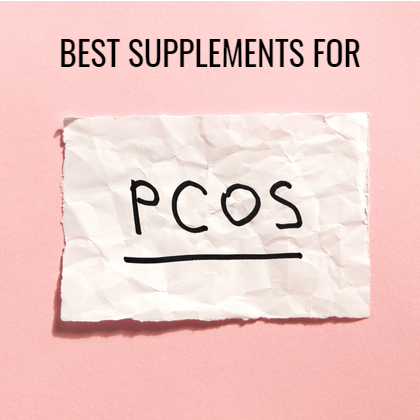
While PCOS and the menopause are both female hormonal conditions, they affect hormone levels in very different ways.
In PCOS, throughout the years a woman can get pregnant (around 15-44 years old), she experiences a hormonal imbalance where levels of the hormone progesterone are lower than average, and levels of androgens (male hormones) are higher.
 The menopause, however, is characterised by a drop in female sex hormone levels and marks the end of a woman’s reproductive years.
The menopause, however, is characterised by a drop in female sex hormone levels and marks the end of a woman’s reproductive years.
How does PCOS affect your hormone levels?
Most experts agree that hormonal imbalance is at the root of PCOS, but the precise cause of this remains unclear.
Generally speaking, women with PCOS produce higher concentrations of male sex hormones, or androgens, and lower levels of the female sex hormone, progesterone. This affects ovulation patterns and, by association, the menstrual cycle.
What hormonal changes happen during the menopause?
The menopause marks the end of menstruation and, therefore, a woman’s reproductive years. Some years before the menopause, oestrogen and progesterone levels decline, in a hormonal transition called the perimenopause.
As a woman approaches the menopause, oestrogen and progesterone eventually drop so significantly that she stops ovulating, which ceases menstruation altogether.
Is it PCOS or the menopause?
Some symptoms of the perimenopause are similar to PCOS symptoms, and if a woman starts experiencing symptoms of PCOS in her 30s and 40s — around the time of the perimenopause — it can be hard to distinguish between the two.
When women with PCOS enter the perimenopause, they can experience symptoms of both conditions. It’s also worth noting that women with PCOS tend to reach menopause two years later than women without PCOS (1).
Which symptoms are similar?
The perimenopause and PCOS share these symptoms:
-
Mood swings
-
Sleep issues
-
Irregular or missed periods
-
Thinning hair on the head
-
Weight gain
-
Unwanted facial or body hair
How to tell the difference in your symptoms
Some symptoms, however, are unique to either the perimenopause or PCOS. Understanding these idiosyncrasies can help to differentiate between the two conditions.
Symptoms unique to the perimenopause that don’t happen in PCOS:
-
Hot flashes
-
Night sweats
-
Intimate dryness
-
Changes in libido
-
Urinary incontinence
Symptoms unique to PCOS that don’t occur in perimenopause:
-
Acne
-
Headaches
-
Pelvic pains
How does menopause affect PCOS?
Since the perimenopause is often associated with weight gain and increased cardiovascular risk, some research suggests that these symptoms can be aggravated in women who also have PCOS. It’s thought that this is due to the metabolic disturbances associated with PCOS (2).
How does menopause affect PCOS?
Ultimately, the menopause doesn’t cure PCOS. The hormonal fluctuations in the perimenopause are unable to address the hormonal imbalance that characterises PCOS.
Does PCOS get worse with age?
Experts have hotly debated how PCOS changes with age. Ultimately, it will depend on your situation, although some women experience less symptoms of PCOS post-menopause. In one study, researchers compared the hormone levels of women with PCOS to those without the endocrine condition (3). Then, 21 years later, researchers re-examined the participants’ hormone profiles.
The study revealed that the testosterone levels in women with PCOS eventually decreased, albeit gradually. Crucially, however, testosterone didn’t reach normal levels until 20 years after the menopause. This result is another clear indication that the menopause is unable to redress PCOS symptoms.
Although the drop in testosterone wasn’t successful at reducing all PCOS symptoms, it certainly had a positive impact on the participants’ when they got older. In particular, researchers reported the women had more regular menstrual cycles than before.
Managing PCOS in the perimenopause
Improve Sleep Hygiene
Symptoms of the perimenopause and PCOS can make it harder to attain quality sleep. Try to prioritise getting enough rest each night with these tips:
-
Keep regular sleep and wake hours, even at the weekends
-
Avoid using technology 90 minutes before bed (the blue light emitted from devices can inhibit the production of your sleep hormone, melatonin)
-
Remove all screens from your bedroom
-
Don’t use your phone as an alarm clock
-
Fit blackout blinds in your bedroom
-
Limit your caffeine intake after 12 pm
-
Embrace morning light with regular outdoor breaks
Weight Management
PCOS and perimenopause can also make weight gain more likely. To maintain a healthy weight, try these simple switches:
-
Eat a whole food diet — that is, food in its natural state
-
Avoid eating shop-bought food with more than 5 ingredients
-
Aim for upwards of your 5-a-day
-
Drink at least 1.5 litres of water daily
-
Remove refined sugar from your diet. If you experience a sugar craving, have a handful of nuts, glass of water, or square of 70% dark chocolate.
-
Reduce portion size and skip seconds
-
Perform some form of physical activity daily
Managing one hormonal condition can be challenging, so managing two can feel even more daunting. Understanding your conditions is the best way to know how best to manage them. If you’re looking for more information on PCOS, follow this link for our dedicated hub. Alternatively, find out more about the menopause in our Menopause hub.
References:
-
Welt. C., Carmina E., Lifecycle of polycystic ovary syndrome (PCOS): From in utero to menopause. The Journal of Clinical Endocrinology and Metabolism. 2013 December 1;12(1):4629-4638.
-
Lenart-Lipinska M. et al., Polycystic ovary syndrome: clinical implication in perimenopause. Menopause Review. 2014;13(6):348-351.
-
Schmidt J. et al., Reproductive hormone levels and anthropometry in postmenopausal women with polycystic ovary syndrome (PCOS): A 21-year follow-up study of women diagnosed with PCOS around 50 years ago and their age-matched controls. Journal of Clinical Endocrinology and Metabolism. 2011 July;96(7):2178-2185.
Other Sources:
-
nhs.uk. 2020. Menopause – Symptoms. Available online: https://www.nhs.uk/conditions/menopause/symptoms/
Related Posts
Disclaimer: The information presented by Nature's Best is for informational purposes only. It is based on scientific studies (human, animal, or in vitro), clinical experience, or traditional usage as cited in each article. The results reported may not necessarily occur in all individuals. Self-treatment is not recommended for life-threatening conditions that require medical treatment under a doctor's care. For many of the conditions discussed, treatment with prescription or over the counter medication is also available. Consult your doctor, practitioner, and/or pharmacist for any health problem and before using any supplements or before making any changes in prescribed medications.

Olivia
Olivia Salter has always been an avid health nut. After graduating from the University of Bristol, she began working for a nutritional consultancy where she discovered her passion for all things wellness-related. There, she executed much of the company’s content marketing strategy and found her niche in health writing, publishing articles in Women’s Health, Mind Body Green, Thrive and Psychologies.
View More



